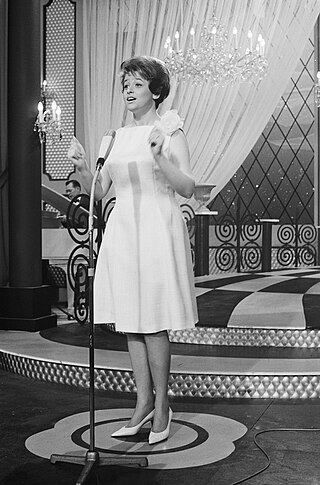Yugoslavia was present at the Eurovision Song Contest 1966, held in Luxembourg, Luxembourg.

Tonia is a Belgian singer, best known for her participation in the 1966 Eurovision Song Contest.
Belgium was represented by Jacques Zegers, with the song "Avanti la vie", at the 1984 Eurovision Song Contest, which took place on 5 May in Luxembourg City. Zegers was the winner of the Belgian national final for the contest, held on 2 March.
Belgium was represented by Pierre Rapsat, with the song "Judy et Cie", at the 1976 Eurovision Song Contest, which took place on 3 April in The Hague. Rapsat was the winner of the Belgian national final for the contest, held on 21 January.
Belgium was represented by Jacques Hustin, with the song "Fleur de liberté", at the 1974 Eurovision Song Contest, which took place on 6 April in Brighton, England. Hustin was the winner of the Belgian national final for the contest, held on 14 January.
Belgium was represented by Serge and Christine Ghisoland, with the song "À la folie ou pas du tout", at the 1972 Eurovision Song Contest, which took place in Edinburgh on 25 March. "À la folie ou pas du tout" was the winner of the Belgian national final for the contest, held at the RTB studios in Brussels on 15 February. The Ghisolands had previously participated in the Belgian final in 1970.
Belgium was represented by Jean Vallée, with the song "Viens l'oublier", at the 1970 Eurovision Song Contest, which took place in Amsterdam on 21 March. "Viens l'oublier" was chosen at the Belgian national final on 3 February.
Belgium was represented by Claude Lombard, with the song "Quand tu reviendras", at the 1968 Eurovision Song Contest, which took place on 6 April in London. The song was chosen at the Belgian preselection, held on 13 February. Former Belgian representative Tonia (1966) and future participant Nicole Josy also took part.
Belgium was represented by Lize Marke, with the song "Als het weer lente is", at the 1965 Eurovision Song Contest, which took place on 20 March in Naples. Marke was chosen internally to be the Belgian representative, and the song was chosen in the national final on 13 February. Marke had previously finished second in the Belgian preselection in 1963.
Belgium was represented by Fud Leclerc, with the song '"Ton nom", at the 1962 Eurovision Song Contest, which took place on 18 March in Luxembourg City. The song was chosen in the Belgian national final on 19 February. This was Leclerc's fourth time at Eurovision, and he still shares the record for the most Eurovision appearances as a main performer. "Ton nom" has also gone down in history as the first Eurovision performance ever to score the infamous nul-points.
Belgium was represented by Fud Leclerc, with the song "Mon amour pour toi", at the 1960 Eurovision Song Contest, which took place on 19 March in London. The song was chosen in the Belgian national final on 24 January. This was the third of Leclerc's four appearances for Belgium at Eurovision.
The Netherlands was represented by Milly Scott, with the song "Fernando en Filippo", at the 1966 Eurovision Song Contest, which took place on 5 March in Luxembourg City. Five acts participated in the Dutch preselection, which consisted of five qualifying rounds, followed by the final on 5 February. All the shows were held at the Tivoli in Utrecht, hosted by the 1959 Eurovision winner Teddy Scholten.
The Netherlands was represented by duo De Spelbrekers, with the song '"Katinka", at the 1962 Eurovision Song Contest, which took place on 18 March in Luxembourg City. "Katinka" was the winner of the Dutch national final for the contest, held on 27 February.
Denmark was represented by Hot Eyes, with the song "Det' lige det", at the 1984 Eurovision Song Contest, which took place on 5 May in Luxembourg City. "Det' lige det" was chosen as the Danish entry at the Dansk Melodi Grand Prix on 18 February. This was the first of three Eurovision appearances in five years for the couple.
Germany was represented by Danish singer Gitte Hænning, with the song "Junger Tag", at the 1973 Eurovision Song Contest, which took place on 7 April in Luxembourg City. "Junger Tag" was the winner of the German national final, Ein Lied für Luxemburg, held on 21 February.
Denmark was represented by Ulla Pia, with the song "Stop – mens legen er go'", at the 1966 Eurovision Song Contest, which took place on 5 March in Luxembourg City. "Stop – mens legen er go'" was chosen as the Danish entry at the Dansk Melodi Grand Prix on 6 February.
Norway was represented by Åse Kleveland, with the song "Intet er nytt under solen", at the 1966 Eurovision Song Contest, which took place on 5 March in Luxembourg City. "Intet er nytt under solen" was chosen as the Norwegian entry at the Melodi Grand Prix on 5 February.
France was represented by Annick Thoumazeau, with the song "Autant d'amoureux que d'étoiles", at the 1984 Eurovision Song Contest, which took place on 5 May in Luxembourg City. The song was chosen through a national final organised by broadcaster Antenne 2.

Finland was represented by Marion Rung, with the song "Tipi-tii", at the 1962 Eurovision Song Contest, which took place on 18 March in Luxembourg City. "Tipi-tii" was chosen as the Finnish entry at the national final organised by broadcaster Yle and held on 15 February. Rung would represent Finland again in the 1973 contest, also held in Luxembourg.
Portugal was represented by Madalena Iglésias, with the song "Ele e ela", at the 1966 Eurovision Song Contest, which took place on 5 March in Luxembourg City. "Ele e ela" was chosen as the Portuguese entry at the Grande Prémio TV da Canção Portuguesa on 15 January.

